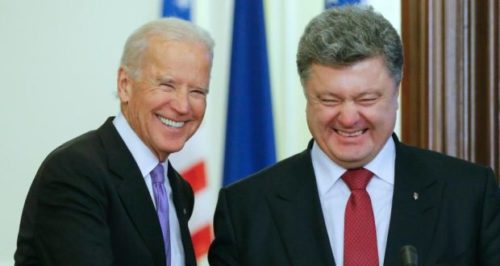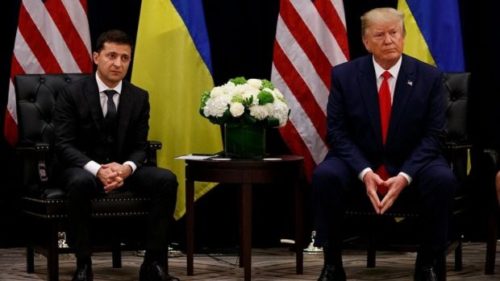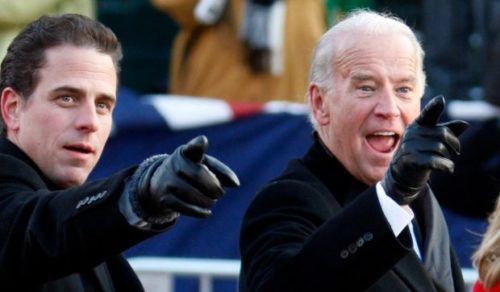 Anti-Imperialism protest in the Phillippines. Photo: Carlo Manalansan by Bulatlat
Anti-Imperialism protest in the Phillippines. Photo: Carlo Manalansan by Bulatlat
‘Ukrainegate’ has opened the floodgates of impeachment in Washington, DC. President Trump’s phone call with Ukrainian President Zelensky provided such an opportunity that Democratic Leader Nancy Pelosi, who resisted pressure for impeachment, is now on board along with a majority of the party. Democrats are moving quickly to make Trump the third president ever to be impeached.
Conviction is up to the Republican-controlled Senate, where a two-thirds vote is required, so that is very unlikely. Trump will probably be the Republican nominee even though he has never broken 50 percent support in the polls. Chris Hedges writes that a partisan impeachment will anger the people in Trump’s base who view him as challenging the establishment and could backfire for the Democrats.
The political impact of impeachment depends on how the Democrats build their case and whether it becomes bi-partisan. Richard Nixon grew more unpopular and public support for his impeachment grew during the process. Bill Clinton consistently had more than 60 percent support during his presidency, ending with 66 percent popularity while support for impeachment decreased as it progressed. Trump starts with a historically low level of popularity, whether an angered base and failed impeachment in the Senate will help Trump is too soon to say.
Impeachment by the House seems inevitable even though less than a majority of voters currently support it. The Democrats need to be careful because shining a light on Ukraine, where Obama-Biden conducted the most open coup in US history (until the recent Trump failed coup in Venezuela,) could undermine Joe Biden, their highest polling candidate. It will also expose the ugly realities of US foreign policy, the corporate control of both parties and the need for fundamental change in US politics.
 Joe Biden with Petro Poroshenko, who was an informant for the US government for six years before becoming president. Photo: Sergey Dolzhenko for EPA.
Joe Biden with Petro Poroshenko, who was an informant for the US government for six years before becoming president. Photo: Sergey Dolzhenko for EPA.
The US Coup in Ukraine
The openness of the US coup in Ukraine is something to behold. In December 2013, Victoria Nuland, the Assistant US Secretary of State for Europe and Eurasia, bragged to a meeting of the International Business Conference sponsored by the US-Ukrainian Foundation that the US had ‘invested’ more than $5 billion and “five years worth of work and preparation” to bring Ukraine into the US orbit. In November 2013, President Yanuyovch rejected an EU Agreement in favor of joining Russia’s Common Union with the other Commonwealth Independent States.
The timeline of events around the coup shows pressure and bribery were being used including the promise of a $1.5 billion International Monetary Fund (IMF) loan and $850 million from the World Bank. Nuland described three trips to Ukraine where she made it “absolutely clear” to Yanukovych that the US required “immediate steps” …to “get back into conversation with Europe and the IMF.” Threats and payoffs were the modes of US operation.
Nuland was also meeting with the Ukrainian opposition including the neo-Nazi Svoboda party. Less than one month before the coup removed Yanuyovch on January 30, 2014, the State Department announced Nuland would be meeting “with government officials, opposition leaders, civil society and business leaders to encourage agreement on a new government and plan of action.” On February 4, Nuland was caught speaking on a taped open telephone conversation with US Ambassador to Ukraine Geoffrey Pyatt, discussing the next government saying, “I think Yats is the guy,” referring to Holocaust-denier, Arseniy Yatsenyuk, who became the post-coup prime minister. In the call, she also urged that Yats should work with neo-Nazis.
Shortly after Yats became Prime Minister, Joe Biden called him. Biden was the White House point-person on Ukraine. At a press conference, Obama touted Biden’s role while stumbling over Yats’ name, saying: “Vice President Biden just spoke with Prime Minister [pause] – the prime minister of Ukraine to assure him that in this difficult moment the United States supports his government’s efforts.”
In addition to Yats, the post-coup president of Ukraine was known by US authorities as “Our Ukraine Insider” or “OU.” A series of Wikileaks documents showed OU had been working as an informant for the United States for six years. A Wikileaks cable made clear the US considered Petro Poroshenko to be corrupt but his “price had to be paid.” In a cable involving Secretary of State Clinton, OU explained the value of the US being in Crimea — Russia’s only seaport and long-time naval base.
OU added another US agent, Natalia Jaresko, a long-time State Department official, who went to Ukraine after the U.S.-sponsored Orange Revolution. Jaresko was made a Ukrainian citizen by OU on the same day he appointed her finance minister. Between the Orange Revolution and the 2014 coup, William Boardman reports, Jaresko ran a hedge fund in Ukraine used to manage “a CIA fund that supported ‘pro-democracy movements’ and laundered much of the $5 billion the US spent supporting the Maidan protests that led to the Kiev coup.” Jaresko received $1.77 million in bonuses from the tax-payer funded investment project in addition to her $150,000 annual salary. She is now head of the “La Junta” in Puerto Rico.
In addition to controlling the top government posts in Ukraine, the US moved to control key economic sectors. Regarding agriculture, Monsanto was given the ability to buy property (which had been previously forbidden) and an $8.7 billion IMF loan required Ukraine to allow biotech farming and the sale of Monsanto’s poison crops and chemicals thereby destroying farmland that was one of the most pristine in Europe.
Regarding energy, the largest private gas company in Ukraine, Bursima Holdings, appointed Vice President Joe Biden‘s son, Hunter Biden, and a close friend of Secretary of State John Kerry, and Devon Archer, the college roommate of Kerry’s stepson, to the board. Archer also served as an adviser to Kerry’s 2004 presidential campaign, co-chaired his National Finance Committee and serves as a trustee of the Heinz Family Office, which manages the family business. Hunter Biden and Archer, along with Christopher Heinz, co-founded Rosemont Seneca Partners.
 President Donald Trump and Ukrainian President Volodymyr Zelensky meet in New York on September 25, 2019, on the sidelines of the United Nations General Assembly. Photo: Saul Loeb for Getty Images
President Donald Trump and Ukrainian President Volodymyr Zelensky meet in New York on September 25, 2019, on the sidelines of the United Nations General Assembly. Photo: Saul Loeb for Getty Images
Trump’s Phone Call with Zelensky Urging Investigation of Biden
Donald Trump is concerned about Biden as a political opponent in the 2020 election. Although he is fading in current polls, Biden still leads among Democrats seeking the nomination and defeats Trump in all head-to-head polls, as do other leading Democratic candidates.
The impeachment spike occurred because of a July 25 telephone call between Trump and President Zelensky where Trump urged Zelensky to investigate Biden. A CIA official filed a whistleblower complaint about it and the Inspector General sent a letter to Jerry Maguire, Director of National Intelligence, who initially withheld both from Congress. The Inspector General of the Intelligence Community, Michael Atkinson, found the complaint to be “credible” and “of urgent concern” and alerted Rep. Adam Schiff, the Chair of the House Intelligence Committee, about it. The administration has taken steps to restrict access to records of the call, the transcript of which has still not been provided to Congress.
Since December 2018, Rudy Guiliani had been pressuring Ukraine to investigate Biden and Hunter Biden’s involvement with Bursima. The April 21 election of Zelensky and July 21 Parliamentary elections, which brought in a new government, undid much of Guiliani’s lobbying. Trump’s call after the legislative elections, ostensibly to congratulate Zelensky, included multiple mentions of the need to investigate Biden. The Washington Post reports, “Days after the two presidents spoke…Giuliani met with an aide to the Ukrainian president in Madrid and spelled out two specific cases he believed Ukraine should pursue. One was a probe of a Ukrainian gas tycoon who had Biden’s son Hunter on his board. Another was an allegation that Democrats colluded with Ukraine to release information on former Trump campaign chairman Paul Manafort during the 2016 election.”
Manafort was one of the few convictions from the Mueller investigation. Manafort was indicted on twelve counts, including committing conspiracy against the United States by failing to register as a foreign agent of Ukraine. Manafort pleaded guilty to that charge in September 2018.
Democrats calling for impeachment describe Trump’s actions as coercing a foreign nation into the 2020 elections by pressuring them to investigate a chief rival, Joe Biden. Trump withheld military funding for Ukraine and scheduling a meeting with Zelensky at the White House as coercive instruments. US policy in Ukraine has emphasized militarism against Russia since the coup. The New Yorker reports, “McCain was calling for the U.S. to arm Ukraine for defense against a ‘Russian invasion’ that he sees as part of Putin’s plan to ‘re-establish the old Russian empire.’ McCain also called for the U.S. to send military ‘advisors.’”
Trump says he is waiting to see if Zelensky will “play ball” with the US. Trump is using threats and payoffs in Ukraine, just as Joe Biden did.
 Joe Biden points to some faces in the crowd with his son Hunter in Washington, D.C., January 20, 2009. Photo: Carlos Barria For Reuters.
Joe Biden points to some faces in the crowd with his son Hunter in Washington, D.C., January 20, 2009. Photo: Carlos Barria For Reuters.
The Risk to Biden Grows
While Trump is deservedly at serious risk for impeachment, the risk to Biden is also growing. Politico reports that Joe Biden is waging war on the Hunter Biden-Ukraine reporting. The risk to Biden is existential, he needs Democrats to remain silent and for the impeachment inquiry not to examine what Trump was investigating in Ukraine.
In January 2018, Biden bragged on video in his speech to the Council on Foreign Relations how he pressured Ukraine to fire Prosecutor General Viktor Shokin saying he would not approve a $1 billion dollar IMF loan if Shokin was not fired before Biden left Ukraine during a six-hour visit. On April 1, The Hill published an article that reports: “The prosecutor [Biden] got fired was leading a wide-ranging corruption probe into the natural gas firm Burisma Holdings that employed Biden’s younger son, Hunter, as a board member.” They report Rosemont Seneca Partners received “regular transfers into one of its accounts — usually more than $166,000 a month — from Burisma from spring 2014 through fall 2015,” confirmed by US banking records. Shokin’s file shows prosecutors identified Hunter Biden, business partner Devon Archer, and their firm, Rosemont Seneca, as potential recipients of the money.
The article further reports that Shokin wrote before he was fired that he had made “specific plans” for the investigation that “included interrogations and other crime-investigation procedures into all members of the executive board, including Hunter Biden.” This is consistent with a sworn affidavit of Shokin (see shokin-ukraine-prosecutor-sworn-statement) where he said, “Poroshenko asked me to resign due to pressure from…Joe Biden…who was threatening to withhold USD $1 billion in subsidies to Ukraine until I was removed.” There were no complaints against Shokin at the time. He explains, “The truth is I was forced out because I was leading a wide-ranging corruption probe of Bursima Holdings.” Shokin describes how Poroshenko had asked him to end the probe multiple times and he had refused.
The Hill reports that “interviews with a half-dozen senior Ukrainian officials confirm Biden’s account, though they claim the pressure was applied over several months in late 2015 and early 2016, not just six hours of one dramatic day.” Obama named Biden the administration’s point man on Ukraine in February 2014, after the coup and as Crimea was voting to return to Russia.
The New Yorker not only details Hunter’s personal and professional problems but also reports that Guiliani said “in the fall of 2018, he spoke to Viktor Shokin, Ukraine’s former Prosecutor General. Shokin told him that Vice-President Biden had him fired in 2016 because he was investigating Burisma and the company’s payments to Hunter and Archer. Giuliani said that, in January 2019, he met with Yurii Lutsenko, Ukraine’s current prosecutor general, in New York, and Lutsenko confirmed Shokin’s version of events.” Biden and his supporters are working to change the narrative, perhaps the impeachment inquiry will get the facts out.
This weekend, Mykola Azarov, Ukraine’s former prime minister from 2010-2014, said in an interview that Ukraine must investigate whether Hunter Biden’s role in Burisma complied with the country’s laws; i.e., investigate what Biden had done for Burisma to justify his remuneration. Further, he said allegations that Joe Biden had gotten Ukraine’s prosecutor general fired to protect his son must also be investigated. On Friday, Ukraine’s National Anti-Corruption Bureau said it was investigating activity at Burisma between 2010-2012, but it was not looking into changes to its board in 2014 when Hunter Biden joined.
 Protesters opposing a coup against Nicolás Maduro outside the Venezuelan embassy in Washington, DC, on May 16, 2019. Photo: Jose Luis Magana for AP.
Protesters opposing a coup against Nicolás Maduro outside the Venezuelan embassy in Washington, DC, on May 16, 2019. Photo: Jose Luis Magana for AP.
The Quagmire Of US Imperialism
The Ukraine crisis exposes the bipartisan corruption inherent in the US imperialist foreign policy. An investigation into Ukraine may expose what are actually common practices by both Democratic and Republican administrations in regime change efforts. As John Kiriakou explained when he gave a talk at the Venezuelan Embassy during the Embassy Protection Collective action, the CIA has a secret regime change office that provides plans to overthrow any government the US chooses to target. These plans involve similar tactics – the investment of large amounts of money into NGOs (often ‘human rights groups’), support for a violent opposition, installing US-trained and controlled leaders and payoffs for those involved.
In the past, these practices occurred behind closed doors, but now it seems the ruling class has become so brazen, it doesn’t try very hard to hide what it’s doing. This provides an opportunity for the public to discuss whether or not the current foreign policy is serving our interests or the world. If we agree that it doesn’t, then it is up to us to organize to change it.
Regime change efforts have had disastrous consequences. Certainly, no country is better off than it was before US interference. Look at Iraq and Libya, thriving countries that were thrown into chaos, for recent examples. Ukraine has elected a new government, but its GDP is 24 percent smaller now than it was in 1993, and corruption has continued. And the echoes of US regime change from 1953 in removing Mohammad Mosaddegh, the elected Prime Minister of Iran, continue to reverberate and poison relations between the US and Iran.
Other countries have resisted regime change but have paid a heavy price. Syria is trying to rebuild after more than eight years of war instigated and supported by the US. Venezuela is resisting ongoing coup attempts and brutal unilateral coercive measures imposed by the US. This week at the United Nations, Venezuela successfully prevented the US from removing its diplomats but the US doubled down on its regime change tactics. Even leading Democratic candidates Bernie Sanders and Elizabeth Warren are making false claims about Venezuela.
As residents in a corrupt, corporate-controlled, imperialist country, we have a responsibility to ourselves and the world to take action to stop the US disastrous foreign policy. The world is changing. The US will no longer be the hegemon. Will we allow the US to continue wreaking havoc as it goes down, or are we ready to change course and become a cooperative member of the global community? Last weekend, we held the People’s Mobilization to Stop the US War Machine. On October 11, we’ll participate in the Rage Against the War Machine actions at the White House. We are committed to organizing to end US imperialism because it is fundamental in creating the future world we need.










